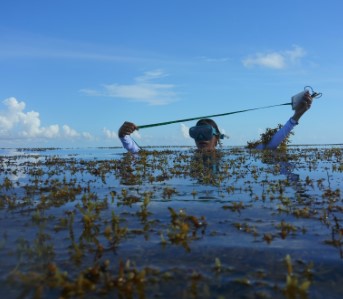Seafields, the UK aquaculture business that aims to remove billions of tonnes (1Gt) of CO2 from the atmosphere with a hyper-scale seaweed farm, has announced it will tokenise its annual goal of one billion carbon removal credits in an exclusive deal with pioneering blockchain marketplace, JustCarbon.
Seafields is introducing new technologies focused on the tracking, harvesting, baling and storage of Sargassum, a seaweed it plans to grow in its aqua-farms in the South Atlantic Ocean gyres.
Using its innovative approach, Seafields is radically tackling the challenge of climate change and aims to remove over 1Gt (one billion metric tonnes) of CO2 from the atmosphere each year by 2030.
JustCarbon is a blockchain-based carbon marketplace, where carbon emissions can be mitigated with the purchase of JustCarbon Removal tokens (JCRs). One JCR token equates to exactly one tonne of carbon removed from the atmosphere, verified to the highest international standards.Buyers, consumers or wholesalers can retire, sell or purchase more JCRs, and offset their historic or future carbon impact.
Seafields’ vision to build a mega-farm the size of Portugal (94,000 sq km) off the coast of West Africa in the South Atlantic gyre to grow, harvest, bail and sink sargassum seaweed and remove 1 billion tonnes of CO2 from the atmosphere each year is ambitious. However, the team of leading scientists and impact investors backing it are confident that when fully operational in 2031, this venture will become a powerhouse to enable much-needed carbon removal from the atmosphere.
Carbon credits can sell from anywhere between $6 to $1,000. Much of the value of a credit is down to its ‘additionality’ – whether it has additional benefits to biodiversity and social benefits like job security. With the IMF predicted carbon credit value of $75-plus, the agreement will be worth a projected $750m to JustCarbon and is a first for a project in the nascent ocean blue carbon industry.
“Stopping ongoing carbon emissions isn’t enough. We also need to scrub existing pre-industrial CO2 fast,” stressed John Auckland, Seafields co-founder and Director. “If hyper-scale projects like Seafields do not get the funding and investment needed, we will not meet the targets for the decarbonisation of the globe and limiting global warming to 1.5⁰C.”
“By sustainably growing sargassum, we will use the space available in the ocean to meet the increasing demand for carbon credits over the next two decades while also removing billions of tonnes of CO2 from our atmosphere. When looking at the existing carbon credit market, our project is essentially unviable if we hand over too much of our margin to retailers and other intermediaries. Partnering with JustCarbon allows us to interface directly with the world’s carbon credit buyers to sell for a fair price all around, and importantly a stable price that allows us to build a predictable business model.”
Seafields aims to be certified by a standards body early in 2024 and will start supplying its carbon credits then. Then by 2031 it aims to scale to the gigatonne volume.
Chad Williams, co-founder and Technical Director at JustCarbon said: “JustCarbon has always been a champion and supplier of high-quality nature-based carbon credits. That’s why we take such a small minting fee, as we are aware of the typical intermediary fees of retailing carbon credits, which can be as high as 80% of the value of the credit.
“Our distribution system will allow Seafields to make direct sales to a global market from small amounts right up to industrial amounts to fully offset large scale organisations unavoidable carbon footprint. Ocean based projects are an important part of the future and Seafields is certainly one of the most ambitious. We won’t prevent an environmental disaster if we don’t start financing the best nature-based projects that maintain and add to the planet’s sequestration capacity, so we welcome more to come forward.”



